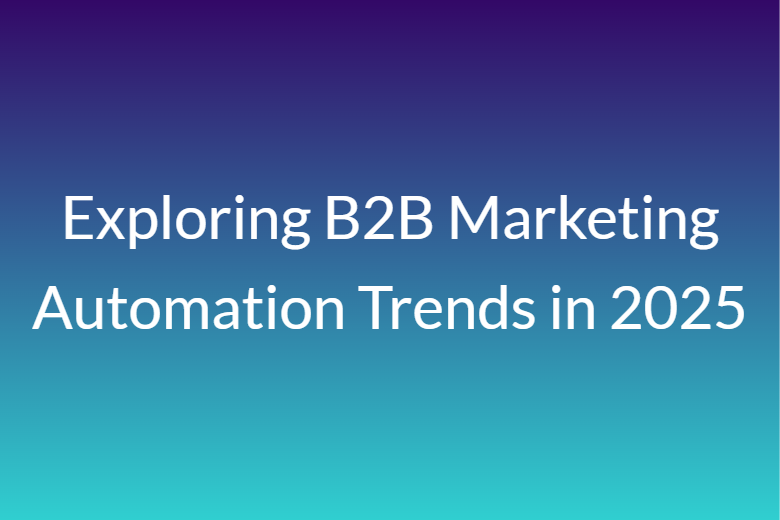In 2025, B2B Marketing Automation is no longer a competitive edge it’s a necessity. As buyer journeys grow more complex and digital channels multiply, automation is the only way to deliver consistent, personalized experiences at scale. Businesses embracing B2B Marketing Automation see improved lead quality, faster conversions, and better alignment between marketing and sales.
B2B Marketing Automation refers to the technology and strategies used to automate marketing workflows, segment audiences, deliver personalized messaging, score leads, and analyze campaign performance. In today’s fast-paced B2B environment, it serves as the backbone for high-impact, data-driven marketing programs.
Why B2B Marketing Automation is Crucial in 2025
Personalization with Precision
Buyers expect relevant communication tailored to their industry, role, and current stage in the funnel. B2B Marketing Automation enables marketers to tailor campaigns dynamically, increasing engagement and boosting lead quality.
Scalable Growth
Manual marketing limits reach and consistency. Automation allows businesses to scale outreach across thousands of leads, delivering messages based on behaviors, interests, and timing—without adding headcount.
Cross-Channel Orchestration
Today’s prospects interact across email, LinkedIn, websites, webinars, and more. B2B Marketing Automation connects these dots, creating seamless multichannel campaigns that follow leads wherever they go.
Revenue Attribution
With advanced tracking and analytics, marketers can directly link campaigns to revenue. Automation platforms offer insights into what content, channels, and timing generate the best return.
Automation in Motion: Key Features in 2025
AI-Powered Lead Scoring
Modern tools use AI models to score leads based on behavior, firmographics, and third-party intent data. This ensures sales teams focus on prospects with the highest likelihood of converting.
Smart Nurture Sequences
Leads who aren’t ready to buy receive automated nurture sequences designed to educate, build trust, and prepare them for future conversion—customized to each industry or pain point.
Dynamic Website Personalization
Your website becomes an extension of your marketing automation platform—displaying different content blocks depending on who’s visiting and what their buying signals suggest.
Intent Data Integration
Platforms now ingest third-party intent data from publishers and B2B research tools, enabling hyper-targeted campaigns focused on prospects actively searching for your solution.
Workflow Visualizers
Automation builders offer drag-and-drop interfaces that allow teams to build workflows based on logic like: “If the user watches a product demo, then send a follow-up testimonial.”
Use Cases Driving Results in 2025
Event Promotion & Follow-Up
Webinars, roundtables, and conferences are promoted through automated invites, reminders, and post-event campaigns that nurture attendees into qualified leads.
Cold Lead Revival
Leads that haven’t engaged in 60+ days are automatically entered into a re-engagement track with refreshed messaging or promotional offers tailored to previous behaviors.
ABM Campaign Delivery
Account-Based Marketing is executed via automation, enabling marketers to send personalized communications to multiple stakeholders within each high-value target account.
Product Education Series
When a lead expresses interest in a product, automation delivers a curated series of emails or videos walking them through use cases, benefits, and client success stories.
Sales Enablement Triggers
Sales reps are notified in real time when leads meet high-intent criteria—such as visiting a pricing page or downloading a case study—so they can follow up with full context.
Overcoming Common B2B Automation Pitfalls
Set It and Forget It
While automation saves time, workflows require regular reviews. Buyer behavior, market conditions, and product offerings evolve—your automation strategy must evolve with them.
Incomplete Data
Effective B2B Marketing Automation relies on rich, accurate data. Use tools to clean, enrich, and validate your lead database regularly for better segmentation and engagement.
Over-Segmentation
Too many segments can lead to fragmented messaging and reduced efficiency. Use smart rules to create manageable, meaningful audience groups.
Not Aligning with Sales
Automation can create a disconnect if sales teams aren’t informed or involved. Ensure automated MQLs are passed on with complete behavioral data and context.
Lack of Testing
Every campaign should be A/B tested—subject lines, send times, content types, and workflows. Automation platforms now offer built-in testing features—use them consistently.
Emerging Trends in B2B Marketing Automation
Conversational Automation
AI chatbots are now integrated directly into automation workflows. They qualify leads, schedule demos, and answer questions instantly—no human required.
Voice Search and Audio Content Integration
Automation tools are now capable of incorporating voice-triggered actions and audio-based content delivery, appealing to time-strapped professionals who consume information on the go.
Automated Video Personalization
Video content can be automatically tailored for each lead using dynamic fields—embedding their name, company, or specific pain points into the footage.
Buyer Journey Forecasting
Using predictive analytics, automation platforms estimate how long a lead will take to convert, what content will influence them most, and when to reach out again.
Unified Marketing-Sales Dashboards
Marketing and sales leaders now use shared dashboards within automation platforms to review pipeline contribution, lead behavior, and revenue attribution in real time.
What to Look for in a B2B Marketing Automation Platform
Not all tools are built the same. In 2025, top-performing marketers choose platforms that offer:
-
Intent Data Compatibility: Look for native integrations with data providers like Bombora or G2.
-
Multi-Channel Automation: Email, SMS, web, chat, social, and even offline triggers should all be manageable from a single platform.
-
Scalability: Whether you’re managing 1,000 or 100,000 leads, your platform should support growth without performance issues.
-
Security and Compliance: Built-in GDPR, CCPA, and DPDP features ensure privacy and data governance are fully automated.
-
Strong Support and Onboarding: Choose vendors with comprehensive training, customer success programs, and community forums.
Platforms like HubSpot, Marketo Engage, ActiveCampaign, Pardot (Salesforce), and SharpSpring lead the market, but selecting the right one depends on your specific needs.
Read the Full Blog Now @ https://acceligize.com/featured-blogs/what-is-b2b-marketing-automation-and-why-it-matters-in-2025/
About Us
Acceligize is a leading global B2B demand generation company that empowers enterprises to fuel their revenue engines with precision-targeted leads. Leveraging data intelligence, AI-driven marketing, and multichannel outreach, Acceligize helps businesses drive growth by aligning marketing efforts with real buyer intent. Our mission is to help organizations across industries achieve superior B2B Marketing ROI through innovation, strategy, and performance marketing excellence.
